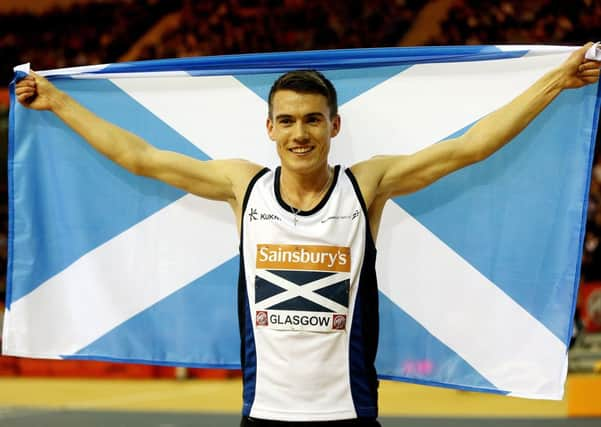Athletics: Chris O’Hare prefers self-help


Still, it’s remarkable how many of them find the best expertise, and the safest refuge, at home.
Chris O’Hare has never seen a sports psychologist, he assured The Scotsman ahead of his first appearance at the World Indoor Championships. We only asked because he had been talking deeply about how to absorb the blow of defeat, not in the existential style of Jean-Paul Sartre but with the surgical clarity of an over-qualified shrink.
Advertisement
Hide AdAdvertisement
Hide AdThe life of a runner is solitary and the ego of a runner is fragile. O’Hare, who will run the 1,500 metres in Sopot after finishing 12th in his first outdoor World Championship final last August in Moscow, used his father Terry as a sounding board during his formative years, and the pair worked in unison to figure out how best he should respond to failure, and in turn success.
An elder brother, Ryan played a role, too, and now O’Hare is providing the same service to his sister, an 800m specialist who, at 18, has followed in his footsteps by enrolling at the University of Tulsa, Oklahoma. Clearly, the O’Hare dinner table is no place for feeling sorry for oneself – it is a family that does not appear to believe in the word “setback”.
“I have never seen a sports psychologist, but I have had a lot of long car rides home, gutted after a race or absolutely elated, and my dad and I have always tried to analyse my performance as best we can without video footage. Then, when the opportunity arises to look at a video, we analyse it again, according to body language,” O’Hare explains.
“I understand the psychological part of it is a huge aspect, but I think it’s something you can do with the help of your family and friends. Maybe I should write a self-help book!
“My younger sister, Olivia, is out [in the US] doing cross-country at the moment and was competing in the Conference Championships. I thought she hadn’t done too badly but she wasn’t very happy with it so we sat down on Friday and talked about what she wants to achieve. We created some stepping stones and tried to psychologically analyse the situation and how she was feeling.
“That’s what I have had to do with myself, and my brother, Ryan, has helped me when I’ve been in those situations. Now I am working with Olivia and making sure she is dealing with disappointment the right way.
“I have found that the best way to deal with a bad race is to remember how hurt you were, but not to dwell on it and instead concentrate on turning that energy into something positive that you can achieve.”
O’Hare wasn’t always so assured in processing bad days at the office. He burst into the limelight 12 months ago when, at the Millrose Games in New York, he set new Scottish indoor records for the 1,500m and the mile. He appears to have matured just in time for a year of unparalleled exposure and opportunity for Scottish runners.
Advertisement
Hide AdAdvertisement
Hide Ad“There hasn’t been one race that stands out for me as really bad, but the 2012 outdoor season didn’t go well as a whole,” he recalls. “Having won the NCAA [American college] title in March I was feeling on top of the world and ready to take on the world, but I had a pretty rubbish outdoor season and then almost ended up making the Olympic team – it was a bit of a rollercoaster ride.
“That was when I started to learn about the mechanisms of how to deal with disappointment, because it was a very tough summer and at the end of July, I was left with nothing to do – I wouldn’t be racing again until the following February. That’s a long time to live with yourself.”
Major indoor meets are breathless. On top of managing pace and race position, runners must contend with the bony warfare that results from rivals being squeezed into a four-lane track with a slope and tight bends. Also, the World Indoors format is straight heats (this morning) into a final (tomorrow night). One of four Scots involved in Sopot, O’Hare is not indulging in medal talk, but he cannot wait for the challenge.
“It’s my first major indoor championships so it will be exciting. I’m looking forward to getting the chance to strut my stuff,” says the Peebles man, one of several Scottish winners at the Glasgow Grand Prix in January. “Indoors is always a different ball game. You’ve got to deal with a lot more argy-bargy, but that’s just part of the deal. There’s a lot of flying elbows and pushing.
“In terms of how you prepare for a race, it’s exactly the same. It’s still 1,500m, but you’ve got to be a bit more turned on mentally, and stay sharp. When you get to the bell, everybody wants to be in front at that point so it’s like there is a race to the bell, then another race to the finish.
“I am not as fit as I would like to be this indoor season, but I’ve changed my opinion of the Glasgow race and the New York race from ‘bad’ to ‘not where I wanted it to be’. I hold high expectations of myself and where other people see a very good performance I am always striving for the next step.”